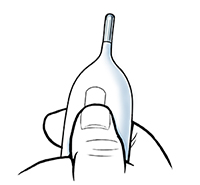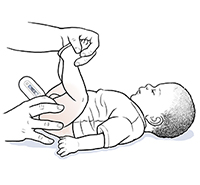Discharge Instructions: Taking a Rectal Temperature (Child)
You take a rectal temperature by placing a thermometer in your child’s bottom. This method is more accurate than most other methods. But do this only when directed by your child’s healthcare provider. Use the steps on this sheet as a guide.
For babies and toddlers, use the rectal thermometer with care. A rectal thermometer may accidentally poke a hole in (perforate) the rectum. Insert it gently. Label it and make sure it's not used in the mouth. It may pass on germs from the stool. Follow the product maker’s directions for correct use. If you don’t feel OK using a rectal thermometer, ask the healthcare provider what type to use instead. When you talk with any healthcare provider about your child's fever, tell them which type you used.
Get the thermometer ready

-
Be sure to use a digital thermometer that is specifically designed for rectal use. Don't use a mercury thermometer.
-
Remove the cover from the thermometer.
-
Wash the thermometer with warm soapy water; then rinse with clear water.
-
Wipe the thermometer dry or let it air dry.
-
Smear a bit of petroleum jelly or water-based lubricant on the tip.
Find a comfortable position for holding your baby

Or
Then
Take the temperature
-
Follow the specific directions for using your digital thermometer.
-
Gently slip the tip of the thermometer into the opening where bowel movements leave the child’s body (the rectum) no farther than ½ inch to 1 inch.
-
Hold the thermometer in place until it beeps.
-
Slide the thermometer out. Read the temperature on the digital display. Normal rectal temperature is about 97.6°F (36.4°C) to 100.2°F (37.9°C).
-
Before putting the thermometer away, clean it with soap and warm water.
Follow-up care
Follow up with your child’s healthcare provider, or as advised.
When to seek medical care
Call your child's healthcare provider right away if any of the following occur:
-
Bleeding from the area where you took the temperature
-
Fever (see Fever and children, below)
-
Your child has had a seizure
-
Your child seems very ill, is listless, is acting very fussy, or refuses to drink fluids.
Fever and children
Below is when to call the healthcare provider if your child has a fever. Your child’s healthcare provider may give you different numbers. Follow their specific directions.
Fever readings for a baby under 3 months old:
Fever readings for a child age 3 months to 36 months (3 years):
Call the healthcare provider in these cases:
Online Medical Reviewer:
Donna Freeborn PhD CNM FNP
Online Medical Reviewer:
Liora C Adler MD
Online Medical Reviewer:
Stacey Wojcik MBA BSN RN
Date Last Reviewed:
12/1/2022
© 2000-2024 The StayWell Company, LLC. All rights reserved. This information is not intended as a substitute for professional medical care. Always follow your healthcare professional's instructions.